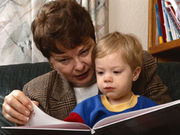American Academy of Pediatrics wants to expand access to family-based therapies
TUESDAY, Nov. 22, 2016 (HealthDay News) — Most preschoolers with mood, behavior, and social disorders would benefit from non-drug therapies, but few receive this type of help, according to a new policy statement from the American Academy of Pediatrics (AAP) published online Nov. 21 in Pediatrics.
As many as one in 10 children younger than 5 years old experience these kinds of mental health problems, according to the report. Current evidence supports the use of family-focused therapies — often including parent training — as a first-line treatment for these children, the AAP reported. Yet mental health stigma, shortages of trained providers, and insurance barriers limit access to evidence-based treatment, it said.
The new report focuses on proven treatments for young children who have these mental health disorders. It notes that the effects of non-drug treatments can last for years, unlike the effects of medication. The report outlines specific family-focused therapies with strong evidence of their effectiveness. The AAP calls for greater funding of programs to expand the mental health workforce and training opportunities for pediatricians. The recommendations also focus on insurance rules and reimbursement practices that impede treatment.
“Young children’s mental health needs have long been overlooked,” report author Mary Margaret Gleason, M.D., an associate professor of psychiatry and behavioral sciences at the Tulane University School of Medicine in New Orleans, told HealthDay. “We don’t want to leave children without treatment because these are real disorders that deserve treatment, and their suffering is real.”
Policy Statement
Technical Report
Copyright © 2016 HealthDay. All rights reserved.








